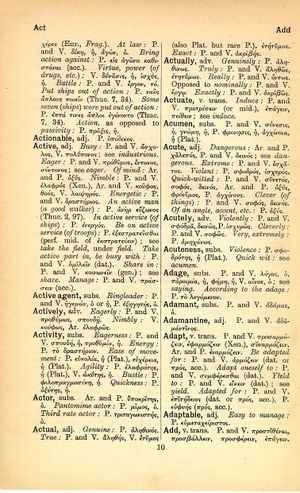active: Difference between revisions
νεκρὸν ἐάν ποτ' ἴδηις καὶ μνήματα κωφὰ παράγηις κοινὸν ἔσοπτρον ὁρᾶις· ὁ θανὼν οὕτως προσεδόκα → whenever you see a body dead, or pass by silent tombs, you look into the mirror of all men's destiny: the dead man expected nothing else | if you ever see a corpse or walk by quiet graves, that's when you look into the mirror we all share: the dead expected this
(6_1) |
(D_1) |
||
| Line 26: | Line 26: | ||
{{Lewis | {{Lewis | ||
|lshtext=<b>actīve</b>: adv.,<br /><b>I</b><br /> v. the foll. [[art]]. fin. | |lshtext=<b>actīve</b>: adv.,<br /><b>I</b><br /> v. the foll. [[art]]. fin. | ||
}} | |||
{{Gaffiot | |||
|gf=<b>āctīvē</b>, au sens actif : Prisc. Gramm. 8, 21. | |||
}} | }} | ||
Revision as of 06:30, 14 August 2017
English > Greek (Woodhouse)
adj.
Busy: P. and V. ἄσχολος, V. πολύπονος; see industrious.
Eager: P. and V. πρόθυμος, ἔντονος, σύντονος; see eager.
Of mind: Ar. and P. ὀξύς.
Nimble: P. and V. ἐλαφρός (Xen.), Ar. and V. κοῦφος, θοός, V. λαιψηρός.
Energetic: P. and V. δραστήριος.
An active man (a good walker): P. ἀνὴρ εὔζωνος (Thuc. 2, 97).
In active service (of ships): P. ἐνεργός.
Be on active service (of troops): P. ἐξεστρατεῦσθαι (perf. mid. of ἐκστρατεύειν); see take the field, under field.
Take active part in, be busy with: P. and V. ὁμιλεῖν (dat.).
Share in: P. and V. κοινωνεῖν (gen.); see share.
Manage: P. and V. πράσσειν (acc.).
Latin > English (Lewis & Short)
actīve: adv.,
I
v. the foll. art. fin.
Latin > French (Gaffiot 2016)
āctīvē, au sens actif : Prisc. Gramm. 8, 21.

